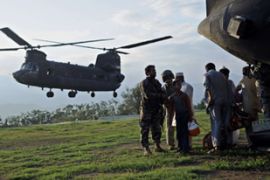UN to issue Pakistan aid appeal
President Zardari returns to flood-devastated country amid chorus of criticism.

“Those who need humanitarian assistance here are certainly more than those needing assistance in any of the other three disasters,” Maurizio Giuliano, an OCHA spokesman told Al Jazeera.
The disaster has engulfed all five provinces, although its full scope is not yet known as many remote communities have yet to receive aid, and relief operations are only taking place whenever weather permits.
Zardari return
Asif Ali Zardari, Pakistan’s president, returned to the country after foreign fundraising trips to a chorus of criticism that he should have stayed at home to manage the crisis.
| Special coverage |
 |
A government official said Zardari was expected to visit flood-hit areas within days, although for some Pakistanis, his efforts were too little, too late.
“All that I can say about Zardari is that our houses are collapsing and his government is not even bothered,” Daraz Gul, a salesman in a hardware market in the town of Nowshera in northwest Pakistan, told the Reuters news agency.
“A government is supposed to be like a parent. If a parent leaves his children in trouble and goes on jaunts abroad, it is scandalous.”
Children are among those most threatened in the aftermath of the flooding, the United Nations said. At least 1,600 people are thought to have already died.
The International Monetary Fund, meanwhile, warned on Monday that Pakistan’s fragile economy could suffer “major harm” as millions of acres of crops have been destroyed and extensive damage done to the electrical infrastructure, forcing power plants to shut down across the country.
Kamal Hyder, Al Jazeera’s correspondent in Punjab, said that the “crisis in Pakistan is of a magnitude that no one could imagine”.
“The United Nations has already said that the devastation caused by this flood is far greater than the [2004 Indian Ocean] tsunami, the Haitian earthquake, as well as other crises that have happened in contemporary times.”
“Pakistan needs international help, and if you asked these people, they want their leaders to come here and to come see what difficult and miserable conditions they are living in.”
Food shortages
Residents in Swat, in northwestern Pakistan, have complained of worsening food and fuel shortages as the crisis drags on.
| FLOOD STATISTICS | ||||||||
|
Food prices are expected to rise as the waters continue to swamp agricultural areas.
More than 252,000 homes have been damaged or destroyed across Pakistan, according to the government.
The army has about 300,000 troops working on the relief effort, but some human rights activists are concerned that the military is undermining civilian institutions.
“Yes, it is the military’s job to take care of the rescue, but the civil administration must be strengthened and properly organised,” Hina Jilani, a Pakistani supreme court advocate, told Al Jazeera.
Jilani said that local communities need to play a larger role in the response.